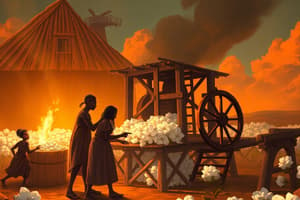Podcast
Questions and Answers
What was the Cotton Gin?
What was the Cotton Gin?
- A method of cotton farming
- A tool for picking cotton by hand
- A type of textile
- A machine invented by Eli Whitney in 1793 that speeded the processing of cotton (correct)
What were some impacts of the Cotton Gin on the economy?
What were some impacts of the Cotton Gin on the economy?
- Made cotton growing less popular
- Increased the use and value of slaves (correct)
- Led to a decrease in cotton demand
- Made cotton the greatest wealth supplier in the United States (correct)
The argument for slave labor was that it was less humane than free labor.
The argument for slave labor was that it was less humane than free labor.
False (B)
What are some arguments against slave labor?
What are some arguments against slave labor?
Restrictions placed on free African Americans included the inability to ______.
Restrictions placed on free African Americans included the inability to ______.
What hardships did enslaved people face on plantations?
What hardships did enslaved people face on plantations?
What types of work did enslaved African Americans perform?
What types of work did enslaved African Americans perform?
What aspects were preserved in African American culture?
What aspects were preserved in African American culture?
Which of the following were ways of resisting slavery?
Which of the following were ways of resisting slavery?
Flashcards are hidden until you start studying
Study Notes
Cotton Gin
- Invented by Eli Whitney in 1793.
- Revolutionized the cotton processing industry, dramatically speeding up production.
Economic Impact of the Cotton Gin
- Increased the popularity of cotton farming across the Southern United States.
- Significantly raised the demand for and consequently the value of slave labor.
- Transformed cotton into a primary economic asset, generating immense wealth.
Arguments For Slave Labor
- Seen as more humane compared to conditions faced by some free labor workers.
Arguments Against Slave Labor
- Freedom to leave a job was a fundamental right of free workers.
- Enslaved individuals suffered physical abuse without recourse.
Restrictions on Free African Americans
- Limited to low-paying, menial jobs.
- Denied the right to vote or serve on juries.
- Forbidden to testify against white individuals in court.
- Excluded from public school systems.
- Faced discouragement from traveling freely.
Hardships on Plantations
- Enslaved individuals had no legal rights or protections.
- Required to perform their tasks flawlessly to avoid punishment.
- Families were frequently torn apart and sold separately.
Types of Work Performed by Enslaved African Americans
- Employed in various domestic roles including nannies, butlers, and housekeepers.
African American Culture
- Rich heritage preserved through African customs including distinct music and dance traditions.
- Spirituals were a significant aspect of cultural expression, often containing deeper meanings related to their experiences.
Methods of Resistance to Slavery
- Engaged in slow work as a form of protest.
- Sabotaged equipment on plantations.
- Fleeing to northern states as a desperate act for freedom.
- Used tactics like feigning ignorance to resist oppressive commands.
Studying That Suits You
Use AI to generate personalized quizzes and flashcards to suit your learning preferences.




